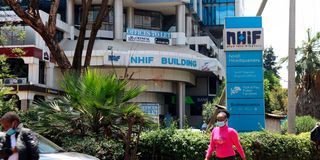KNH makes losses in deal with National Hospital Insurance Fund

National Hospital Insurance Fund headquarters in Nairobi. Kenyatta National Hospital entered into a two-year renewable contract with the NHIF in August 2008.
A contract signed between Kenyatta National Hospital (KNH) and the National Hospital Insurance Fund to treat NHIF members continues to cripple the hospital financially, a report by the Auditor-General shows.
The report notes that failure by the KNH management to push the government to compensate it for land surrendered for the construction of a road has seen it lose about Sh4.2 billion.
The hospital is said to have incurred a Sh313.3 million loss from the contract in the 2019/20 financial year alone, signifying the debt cycle KNH has been pushed into since it began treating patients under the deal.
The report for the 2019/20 financial year shows that the contract has seen the hospital incur huge losses despite calls for a review by KNH bosses.
In 2008, the hospital and NHIF signed the contract to treat members of the scheme at a rebate of about Sh2,400 for inpatient care a day, a deal that was to be renewed in subsequent years.
The rebates were revised to Sh4,000 in 2016.
Between 2014 and 2016, for instance, the hospital had incurred a cumulative loss of about Sh1.2 billion.
KNH in 2014 incurred a loss of Sh347 million, Sh392 million in 2015 and Sh411 million in 2016.
Between 2017 and 2018, the hospital made a cumulative loss of Sh645 million.
In 2017, the hospital registered a loss of Sh377 million and Sh268 million in 2018.
Auditor-General Nancy Gathungu says the loss is net of rebates received from NHIF and the amount the hospital spent in the treatment Fund members.
“The balance includes loss from the NHIF totalling Sh313.3 million.
This loss is net of rebates received from the Fund and the amount KNH spent in treating NHIF members.
“Consequently, the hospital will continue to incur losses if the reimbursable amounts are not reviewed,” Ms Gathungu’s report says.
The Auditor-General adds that the hospital entered into a two-year renewable medical service contract with NHIF in August 2008 to provide treatment for NHIF members, a deal that was renewed in August 2010.
“Since the contract provided for continuous engagement between the parties, the hospital through letters in 2013 and 2014 raised concerns on the losses,” the report says.
“NHIF responded in April 2014, explaining its inability to increase the rebate that had been coupled with litigation, causing delayed adjustment of premiums.”
After exhausting the negotiation mechanisms without success, KNH sought to discontinue the contract.
“The hospital was directed by the Ministry of Health on May 30, 2014 to continue offering the services on the same terms,” the report says.
It adds that though a renegotiated contract signed in March 2019 enhanced the number of claimable services, the losses incurred in the same year were still significant.
The renegotiated contract included rebates for surgical packages and radiology. The rates for CT scan, MRI and ultrasound were revised to Sh8,000, Sh15,000 and Sh3,000 respectively, dialysis at Sh9,500, while chemotherapy and radiotherapy are reimbursed at an NHIF-approved cost.





